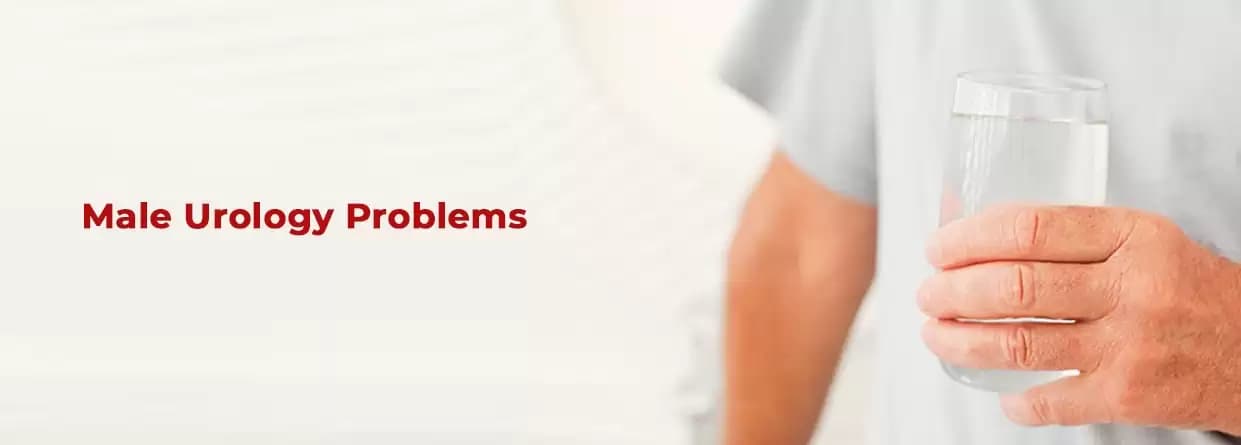
Urology is a medical branch which deals with the conditions or diseases of the urinary tract system Urology is a medical branch which deals with the conditions or diseases of the urinary tract system
Urology is a medical branch which deals with the conditions or diseases of the urinary tract system (including kidney, urinary bladder, ureter, and urethra) of both males and females as well as reproductive organs of the men.
In terms of men's health care, urology treatments play a vital role. Most males face urology problems at some point in their lifetime due to an illness, injury, aging, or a birth defect that requires medical help from urologists. It is important to know about some of the common male urology problems as if these are left untreated, they can result in discomfort, pain, and serious health concerns.
Erectile dysfunction: It is a condition of the penis wherein men face difficulties in getting an erection or maintaining it. This makes the couple depressed as they are not able to enjoy sexual activity. It can be caused due to physical health issues like diabetes, insomnia, hypertension, STDs, heart disease, side effects of certain medications, or abnormal levels of male and female hormones. Some urological conditions that can result in sexual dysfunction include penis trauma, nerve disorders, blood flow issues, and ejaculation problems. It can also be the result of psychological and gynecological concerns.
Peyronie’s disease: It is a condition wherein the penis gets curved, hard, and lump. This is due to the presence of scar tissue that develops underneath the skin of the penis. Often it is caused because of a penis injury. It is a painful disease that can cause problems with the erection of the penis, voiding, and sexual intercourse.
Benign prostatic hyperplasia (enlarged prostate): In old age, most men experience an enlargement of the prostate gland that lies between the penis and urinary bladder, thereby causing urinary problems. Its symptoms include difficulty in starting urination, dribbling at end of urination, urge to urinate, the fullness of feeling of the urinary bladder, and a weak stream of urination.
Urinary tract infections (UTI): Men who have UTI will show symptoms like a painful, burning sensation when urinating; a persistent, strong urge to urinate; passing of a small amount of urine; and a dark, cloudy appearance of urine (sometimes with traces of blood). If one is suffering from any urology concerns schedule an appointment with the Best Urologist in Kolkata.
Kidney stones: It ranges in its size and can stop the outflow of urine if it moves into the ureters and causes its obstruction. It is associated with pain and a backup of urine into the kidneys.
Male infertility: Infertile males are those who are unable to conceive a child. Some of the symptoms include erectile dysfunction, reduced sexual desire, ejaculation problems, a painful swollen lump in the testicle area, lower sperm count, enlarged breasts (gynecomastia), and abnormal hormonal levels.
Urinary incontinence: It is a symptom with many possible underlying reasons that result in involuntary or accidental loss of urine.
Birth control (with vasectomy): In a vasectomy, the vas deferens that carry sperms are cut or blocked so that the ejaculated semen is devoid of sperms. This can help prevent the conceiving of the child.
Sexually transmitted diseases (STDs): Common STDs include Gonorrhoea, Hepatitis A and B, Herpes, Syphilis, HPV, and Chlamydia.
Prostatitis: It is the benign, inflammatory condition of the prostate gland that can lead to difficulty in urinating, pain or discomfort in the genitals, and chills.
Prostate cancer: The prostate gland secretes fluid that protects the sperm. Cancer can occur in the prostate gland, thereby impairing its functioning.
Urologists first conduct a physical examination of the men and discuss with them their medical history. Next, some tests may be recommended including pathology tests, imaging tests, and biopsy.
Some of the male urological problems can resolve on their own or by some medications while others may require advanced therapies. The treatment includes:
For more information schedule an appointment with the best urology doctors at Calcutta Medical Research Institute (CMRI), the Best multispecialty hospital in Kolkata.
Written and Verified by:

Similar Renal Sciences Blogs
Book Your Appointment TODAY
© 2024 CMRI Kolkata. All Rights Reserved.